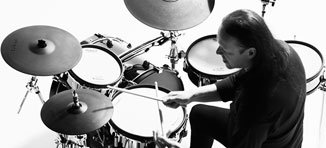Why Do I Need Bass Effects For My Bass Playing?
If you’re playing bass guitar in a band or musical project of any kind, one of the main things you’re probably very aware of, is your tone.
Bass isn’t just bass and “one tone for all” does not suit all bass players. That kind of thinking is not true for guitar players, keyboard players or drummers. Why should it be true for bass players?
You can definitely improve, enhance and compliment your tone as a bass guitarist by using effects pedals. Using bass effects can range from a subtle augmentation to all out tone colouring and can even inspire your playing style! No matter what you want to do, or what you play, there’s a bass effect out there from which you’ll benefit by adding to your rig.
So what’s the difference between bass effects and regular, guitar stompboxes? Glad you asked. It’s all about a bass guitar being a bass guitar.
Most stompboxes have been designed specifically for electric guitars. Because a guitar has a specific frequency range that it produces sound in (usually the mid-range), the effect will work within that range as well. Bass guitars work in lower frequency ranges, so bass effects are specifically voiced to work in similar frequencies as well. It’s just like choosing the right tool for the right job.
Contributed by Byron Struck for the Roland Australia Blog
What Kind Of Bass Effects Should I Consider?
In this article, we’ll look at effects designed and voiced specifically for bass guitars and discuss how you can use them in certain styles of music. We’ll break down each effect and tell you what they’re capable of.
Bass effects don’t always have to be super obvious, like a distortion or wah is. Often, the more “subtle” effects used on bass guitar are the most powerful.
Ok, let’s get into it!
Bass Compression
Why It’s The Most Important Part Of Your Rig
If there’s one effect that any bass player, no matter what they play can benefit from, then its compression. Compression is an effect that’s so useful, audio engineers often add it to every element in a recording mix. Mastering engineers will add it at the final master stage as well.
A compressor is a dynamics processor, so it’ll even out your sound. Quiet notes will become louder and louder notes will become softer. This is especially beneficial for bass playing techniques like slapping and popping, walking basslines, and well…any other time you’re playing notes!
In a live situation in particular, having a consistent, overall volume keeps the body and impact of your tone at the fore. It should go without saying that this is perfect for a great bass sound!
BOSS’ BC-1X Compressor is a revolutionary new design of compressor that will not colour your tone at all. It gives you a natural, multiband compression by intelligently analysing every aspect of your playing in multiple dimensions.
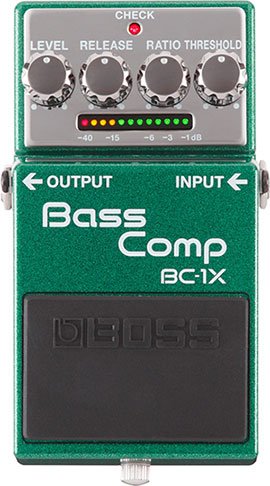
As such, all of your subtle nuances and dynamics will remain intact. Your overall bass sound will improve significantly and you might even become a better player as a result, thanks to the clarity and fullness that this compressor brings! And when it comes to tone, you won’t know that the BC-1X is there, except for when it’s switched off.
Although, some compressors like the BOSS CS-3 also impart certain tonal qualities that some players like. One of the BC-1X’s strengths however, is its tonal transparency.
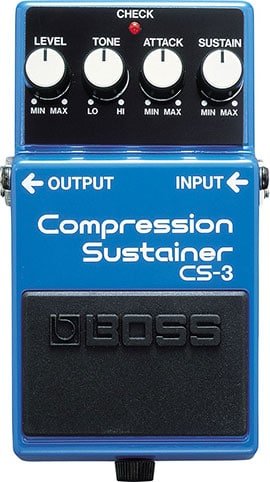
Octave And Bass
Why Keeping The Low End Fat Will Make You Indispensable
Why does bass guitar sound so good? That’s a big question to answer but one reason would have to be because of its ability to generate a fat, low-end thump. The bass rumble is great in so many kinds of music, and having that kind of weight in a band situation is exciting and just…awesome!
A BOSS OC-3 Super Octave is perfect for adding that extra big, fat low-end that audiences and musicians crave. Octave effects are pitch-based effects, so they add a second version of your input signal either higher or lower in pitch than the original signal.
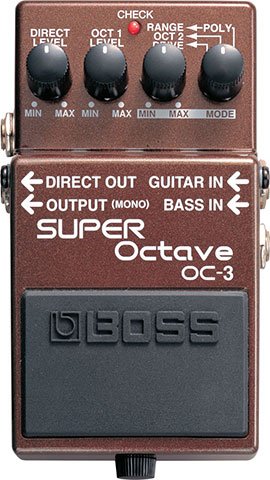
On the OC-3, you can add two extra versions of your input signal, so you’ll wind up with 3 versions of your notes blended together! Set the first octave to one octave lower than your original pitch. Set the second octave to two octaves lower than the original pitch. Then, put on a hard hat because you’ll have the building’s foundations trembling!
The OC-3 also includes a Polyphonic mode, so chords aren’t off limits and a Drive function, for adding dirt and growl to your octave signal.
Bass Overdrive
How To Maximize Your Band’s Sound Immediately
Bringing distortion, overdrive and fuzz to your bass sound gives you much more variety to work with, as opposed to playing with a clean tone. The added drive from these effects produces harmonics, sustain and colour, which provides liveliness and excitement to your bass tone.
If you’re a 3 piece band, a drive pedal will work wonders for your band’s overall sound. The “space” you lack from a 4th instrument like a guitar or a keyboard for instance, will allow the bass more freedom to groove. Adding the extra harmonics and drive to the bass’ sound fills this space nicely.
Used sparingly, a bit of drive will elevate a bass sound and enhance playing nuances, which is perfect for styles like Indie and Post-Rock, Jazz, Prog, or any occasion where you want your bass sound to remain intact, yet boost its character.
In larger doses, distortion will give you an undeniably powerful tone – snarling, aggressive and biting. This goes hand in hand with styles like Punk, Metal and Rock, as well as fringier experimental areas, like Noise.
The BOSS BB-1X Bass Driver is a pedal that completely rethinks the concept of bass drive. Using the same intelligent processing technology as the BC-1X Compressor does, the BB-1X analyses your input signal in multiple dimensions.
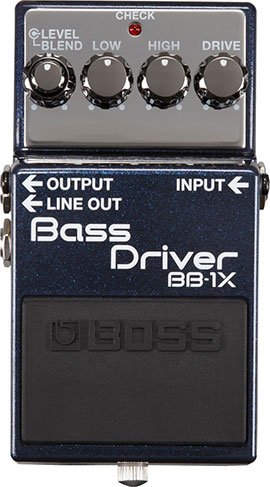
It then provides you with a detailed, responsive sound that retains all of your characteristics and nuances. With drive options that range from subtle to absurd, the BB-1X makes it simple to sculpt your perfect bass sound. Use the BB-1X to shape your sound, but to bolster your dynamics as well.
Another drive pedal option is the BOSS ODB-3 Bass OverDrive. With massive gain and a tailored EQ section, the ODB-3 has you covered for all your heavy bass distortion needs. We even know guitar players who use them!
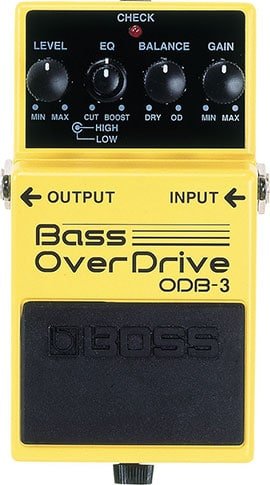
You’ll never lose yourself in grit though, because the useful Balance control on the pedal allows as much or as little of your dry, unaffected signal as you like to enter the mix, to retain clarity and dynamics.
The BB-1X is certainly more geared towards the subtler elements of tone and dynamics, but the ODB-3 is your go-to for all-out grit. Bring the dirt!
Bass Filters
How To Create The Tone Of Pure Funk
Bass is synonymous with Funk. It’s a style of music that has the good sense to put the bass at the fore and keep it there. As such, adding a filter effect to a bass guitar is an ideal accompaniment.
A filter is a kind of effect that focuses on specific frequencies. Using a filter to nail a particular tone or element of your sound can give you great results in Funk, Rock, Hip-Hop and Electronic-focused music.
A filter effect like the BOSS AW-3 Dynamic Wah gives you an automatic wah-wah sound, without needing to rock a pedal back and forth when you’re using it! As it responds to your picking, the variable sound controls “filter” your tone, to give you funky, expressive results.

There’s also a unique “Humanizer” setting as well, which creates human voice-like vowel sounds. And, if you want to add an expression pedal for classic pedal wah control, you can do so with the EXP input.
This is definitely something that makes itself known to everyone who hears it that it’s a specific effect. And that’s why we love it!
EQ And Limiters
How To Define The Shape Of Your Slapping
An EQ (or equalizer), gives you a representation of an audio spectrum. It allows you to boost, cut and control specific frequencies in that audio field. Why you would do this is to shape, sculpt and refine your tone.
Say you’ve got too much harsh high end, or your low end is a bit too “boomy”. An EQ pedal like the BOSS GEB-7 Bass Equalizer gives you the ability to remove parts from those frequencies that are disrupting your sound.
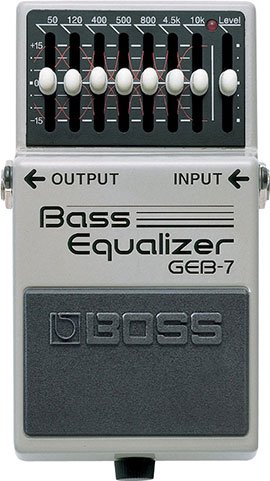
Alternatively, if you’re sounding a bit thin or bland in a particular area like the midrange, EQ lets you boost the frequencies of that area, so that you’re happy with your sound again.
So you can probably see why it’s so useful on a bass guitar sound. You can bring things out of the muck, get them rumbling nicely or contour the higher end to your liking!
The GEB-7 gives you the ability to reinforce dynamics with its frequency sliders, which are essentially little volume controls. But these controls by nature will affect your tone. As such, this is a very useful, overall effect for many purposes.
Limiters are a straight up, solid effect that do exactly what their name says they do. They limit. How do they do this? Great question. Thank you for asking it. What a limiter will do, is suppress an audio signal from exceeding a certain level, as defined by the user.
This means you can control the dynamic range of your instrument so that nothing goes into unwanted sonic territory, like too much high or low end. So for example, if you find a volume that your bass sounds great at, you can set that volume on your limiter to maintain that great sound.
The BOSS LMB-3 Bass Limiter Enhancer is perfect for this function. The additional Enhancement control helps to boost the clarity and presence of your sound.
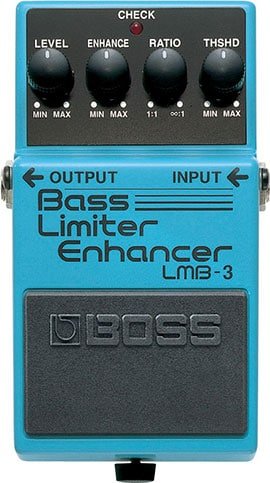
It’s a subtle effect that sets up and maintains a strong, reliable foundation to let you do your thing. It’s certainly not flashy like the AW-3, or brazen like the ODB-3, but its usefulness cannot be understated.
Think of it like a backstage manager* at a concert, working behind the scenes to keep the show rolling on smoothly.
*No disrespect to backstage managers – we know you can be flashy and brazen too. Some of you are especially brazen!
But if you want to use it for a specific purpose, it’s great for slapping and popping because you’re tightening up the dynamics. It gives you a smoother, clearer overall sound and you won’t end up having that dreaded “crumpled up packet of potato chips” tone!
That essentially wraps up our look at some of the most fundamental bass effects. But they certainly don’t stop here. In fact, there are plenty of options to take control of and enhance your bass tone with.
Try a CEB-3 Bass Chorus for lush, smooth modulation sounds, or take things into a completely different direction with the incredible SYB-5 Bass Synthesizer. Plus, anything can benefit from extra space, so check out some delay and reverb pedals for use in combination with your effects and tone. There’s also flanging and phasing, for all those undulating, pulsating and jet-like sweeps.

If you need a variety of tones on tap or want to experiment with multi effects, then the BOSS GT-1B Bass Effects Processor is for you. Designed specifically for bass, the GT-1B gives you the ability to experience how different effects can help to shape your tone.
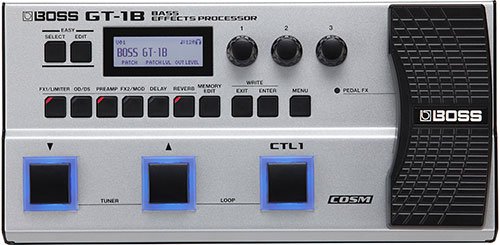
As BOSS’ toolkit for the modern bass player, the GT-1B makes working with effects simple, fast and intuitive. Many of the effects mentioned here, such as Limiters, OverDrive, Distortion and EQ feature in the GT-1B. It also provides a complete array of modulation (chorus, flange, phase, etc.), delay and reverb. There’s also a looper for layering riffs. If you’d like to push your sound even further, there’s a Harmonist, Synth, Defretter and Touch Wah for creating high impact sounds.
With an effects engine that’s capable of mixing multiple effects in sequence, bringing expressive control via an expression pedal and even creating tones on your laptop via BOSS Tone Central or the GT-1B’s editor, you’ll have plenty of ways to keep experimenting with new bass tones.
It’s also ideal for live shows. You can bring a whole palette of sounds anywhere you like, conveniently and with minimal setup. Best of all, the quality of sound is superb, so all you need to do is focus on playing.
We hope that this article has given you some background on how effects for bass can help you find your own sound. Experimenting and switching different effects in and out of your rig is certainly worth trying out. You might even find a new sound you never thought was possible! And even if you want to add a new take on your favourite bass / amp setup, there’s definitely an effect for you. Happy slapping!
Related Articles
BOSS TALK: THE SCIENCE OF BASS OVERDRIVE
SYNTH BASS FOR BASS PLAYERS – PART 1
SYNTH BASS FOR BASS PLAYERS – PART 2
A BEGINNER’S GUIDE TO COMPRESSION


